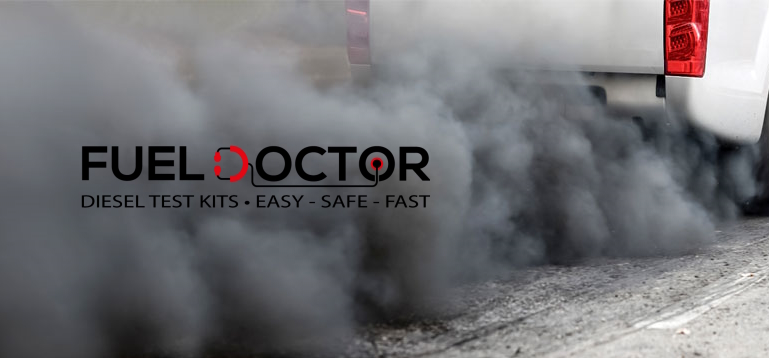You may have seen thick black smoke coming out of an exhaust pipe. Black exhaust smoke is a common issue that can be caused by several factors.
In this article, we will delve into the main causes of black exhaust smoke in diesel engines, how to identify and diagnose the issue, and preventative measures to reduce black exhaust smoke.
Introduction to Black Exhaust Smoke in Diesel Engines
Black exhaust smoke is a visible sign that something is not right with your diesel engine. It is a mixture of unburned fuel and air, carbon particles, and other impurities that make diesel engines produce more emissions than gasoline engines.
Black smoke can be a minor issue, but it can also indicate a more serious problem that needs attention.
How Diesel Engines Work and Why They Produce Smoke
Diesel engines work by compressing air to high temperatures and pressures, which ignites the fuel injected into the engine. The resulting explosion forces the piston down, which then powers the engine. However, when the fuel is not burned completely, it produces black smoke.
Diesel engines produce more smoke than gasoline engines because of their higher compression ratio. The high compression ratio creates more heat, which can lead to incomplete combustion of the fuel. This, in turn, leads to black exhaust smoke.
The Role of Fuel Injectors in Black Smoke Issues
Fuel injectors are one of the primary components of diesel engines that can cause black smoke. They are responsible for delivering the right amount of fuel to the engine at the right time.
If the fuel injectors are not working correctly, they can cause the engine to burn too much fuel, leading to black smoke.
Dirty or clogged fuel injectors can also cause black smoke. When the injectors are dirty, they may not deliver the right amount of fuel to the engine, leading to incomplete combustion and black smoke.

Common Causes of Black Exhaust Smoke
Aside from faulty fuel injectors, several other factors can cause black exhaust smoke in diesel engines. Some of the most common causes include:
- Air filter problems: A clogged air filter can cause the engine to receive less air, leading to incomplete combustion of fuel and black smoke.
- Turbocharger problems: A faulty turbocharger can cause the engine to receive less air, leading to incomplete combustion of fuel and black smoke.
- EGR valve problems: The EGR (exhaust gas recirculation) valve recirculates exhaust gases back into the engine to reduce emissions. If the EGR valve is not working correctly, it can cause the engine to receive too much exhaust gas, leading to incomplete combustion of fuel and black smoke.
- Incorrect fuel timing: If the fuel is injected into the engine at the wrong time, it can cause incomplete combustion of fuel and black smoke.
Identifying and Diagnosing Black Smoke Issues
To identify and diagnose black smoke issues in diesel engines, you need to start by observing the smoke. If the smoke is black and thick, it indicates a problem. You can also use diagnostic tools to check the fuel injectors and other components of the engine.
If you are unsure about the cause of the black smoke, it is best to take your vehicle to a professional mechanic who can diagnose the problem and recommend a solution.
Preventative Measures to Reduce Black Exhaust Smoke
Preventing black exhaust smoke in diesel engines starts with regular maintenance. Here are some preventative measures you can take to reduce black exhaust smoke:
- Regularly change air filters to ensure the engine receives enough air.
- Regularly maintain and clean the turbocharger intercooler/aftercooler to ensure it is working correctly.
- Regularly clean the EGR valve to ensure it is not clogged.
- Regularly maintain the fuel injectors to ensure they are working correctly.
- Use high-quality fuel to ensure complete combustion of fuel.
Repairing Black Exhaust Smoke Issues in Diesel Engines
If you have identified the cause of the black exhaust smoke, you can take steps to repair the issue. Depending on the cause, you may need to replace faulty components such as fuel injectors, air filters, or the EGR valve.
If the issue is caused by incorrect fuel timing, you may need to adjust the timing to ensure proper combustion of fuel. It is best to take your vehicle to a professional mechanic to repair black exhaust smoke issues.
Importance of Maintenance in Preventing Black Exhaust Smoke
Regular maintenance is essential in preventing black exhaust smoke issues in diesel engines. Regular maintenance includes changing air filters, cleaning the turbocharger and EGR valve, and maintaining the fuel injectors.
Regular maintenance can prevent black exhaust smoke and extend the life of your engine.
Environmental Impact of Black Exhaust Smoke
Black exhaust smoke is not only harmful to your engine but also the environment. Diesel engines produce more emissions than gasoline engines, and black smoke is a visible sign of incomplete combustion, which contributes to air pollution.
Black smoke emissions can be harmful to human health and the environment, so it is essential to address the issue.

Importance of Addressing Black Smoke Issues in Diesel Engines
Black exhaust smoke is a common issue in diesel engines, but it can indicate a more serious problem that needs attention. Identifying and diagnosing the cause of black smoke is essential in preventing further damage to your engine and reducing emissions.
Regular maintenance can also prevent black exhaust smoke and extend the life of your engine. Remember, addressing black smoke issues is not only important for your engine but also the environment.
